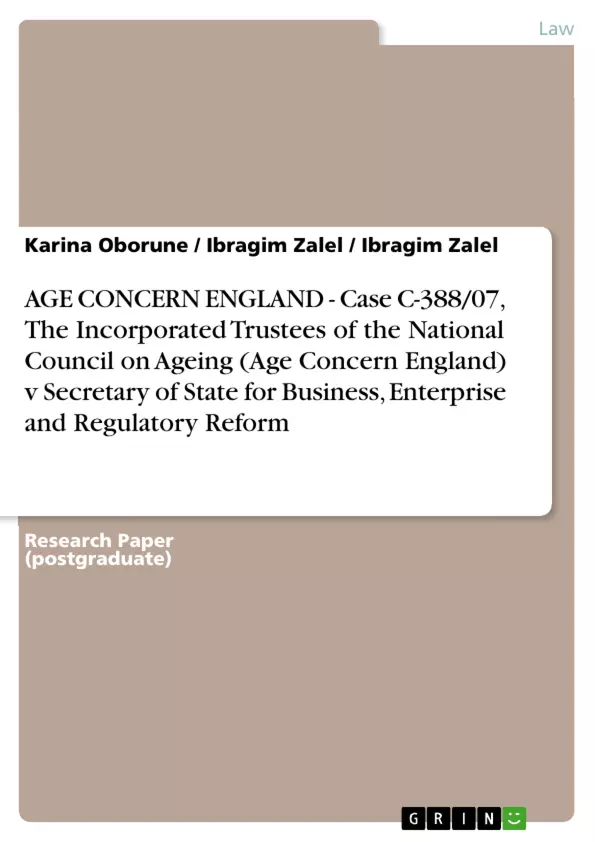The judgments of the European Court of Justice (hereinafter “ECJ”) are not often covered by
media. With an exception, there are some cases that have a great impact in everyday life of
nationals of the European Union (hereinafter “EU”). One of such cases is the long-awaited
Age Concern England, which is significant for confirming that Directive 2000/78/EC of 27 th
November 2000 (Employment Equality Directive, hereinafter “Directive”) prohibits
discrimination on grounds of age.
On 5th March 2009, the ECJ referred a decision back to the High Court after clarifying that
social policy objectives “such as those related to employment and the labour market” may be
considered legitimate under EC law. This means that employers can still lawfully dismiss
employees at the age of 65. In the context of Directive, the present case both covers personal
scope (the Directives apply to all persons: natural and legal, in the EU regardless of
nationality, public and private sector) and material scope (question if retirement ages covered
by Directive).
In fact, Age Concern England case “enriches case law of discrimination on grounds of age,
especially on the obligations of the Member States (hereinafter, “MS”) in respect of the
prohibition of discrimination on grounds of age laid down in Article 2 (hereinafter – “Art.”)
of Directive, particularly the degree with which that prohibition must be transposed into
national law.” Moreover, Age Concern England continues case law of earlier cases involving
arguments regarding discrimination on grounds of age, for example, Mangold, Lindorfer,
Palacios de la Villa and Bartsch.
Opinions among employment lawyers and other experts differ regarding the implications of
the Age Concern England judgment. For employers, generally, this is a good decision; they
can dismiss employees if they wish to. On balance, this is crucial judgment for workers aged
65 and over. There are approximately ten thousand people aged 65 that are forcibly dismissed
every year in United Kingdom (hereinafter “UK”).
Inhaltsverzeichnis (Table of Contents)
- Introduction
- Facts and legal issues
- Opinion of Advocate General (hereinafter “AG\") Jan Mazák¹¹
Zielsetzung und Themenschwerpunkte (Objectives and Key Themes)
This case analysis of Age Concern England explores the legal implications of mandatory retirement age in the European Union. The analysis focuses on the interpretation of Directive 2000/78/EC (Employment Equality Directive) regarding discrimination on grounds of age and its application to national legislation.
- Scope of the Directive in relation to national rules on retirement ages
- Legitimate justifications for age-based discrimination
- The role of the Member States in transposing the Directive
- The distinction between justifiable differences in treatment and unlawful discrimination
- The specific nature of age discrimination within the framework of the Directive
Zusammenfassung der Kapitel (Chapter Summaries)
- Introduction: This chapter introduces the case Age Concern England and highlights its significance in clarifying the applicability of the Employment Equality Directive to age discrimination.
- Facts and legal issues: This section presents the factual background of the case and details the legal questions submitted to the European Court of Justice (ECJ) by the High Court. These questions concern the scope of the Directive, the definition of direct age discrimination, and the test for justification of both direct and indirect discrimination.
- Opinion of Advocate General (hereinafter “AG\") Jan Mazák¹¹: This chapter focuses on the opinion of the Advocate General, Jan Mazák, on the questions posed by the High Court. The opinion provides insights into the application of the Directive, the flexibility afforded to Member States in implementing it, and the specific nature of age discrimination within the context of employment law.
Schlüsselwörter (Keywords)
The case Age Concern England revolves around the application of European Union law to age discrimination in the workplace. Key terms and concepts include the Employment Equality Directive, age discrimination, mandatory retirement age, national legislation, Member State obligations, justification of discrimination, legitimate aims, and the specific nature of age-based discrimination.
Frequently Asked Questions
What is the significance of the Age Concern England case?
It is a landmark European Court of Justice (ECJ) ruling that clarifies how Directive 2000/78/EC prohibits discrimination on the grounds of age in the workplace.
Can employers still lawfully dismiss employees at age 65?
The ECJ ruled that mandatory retirement ages can be legitimate if they are justified by social policy objectives related to the labor market.
What is Directive 2000/78/EC?
Commonly known as the Employment Equality Directive, it establishes a general framework for equal treatment in employment and occupation across the EU.
What was the role of Advocate General Jan Mazák in this case?
He provided an influential legal opinion on the flexibility Member States have when transposing the Directive into national law regarding retirement ages.
How does this case affect workers in the UK?
The judgment was crucial for thousands of UK workers facing forced dismissal at age 65, testing the boundaries of national retirement laws against EU equality standards.
- Citar trabajo
- Karina Oborune (Autor), Ibragim Zalel (Autor), Ibragim Zalel (Autor), 2009, AGE CONCERN ENGLAND - Case C-388/07, The Incorporated Trustees of the National Council on Ageing (Age Concern England) v Secretary of State for Business, Enterprise and Regulatory Reform, Múnich, GRIN Verlag, https://www.grin.com/document/157903



